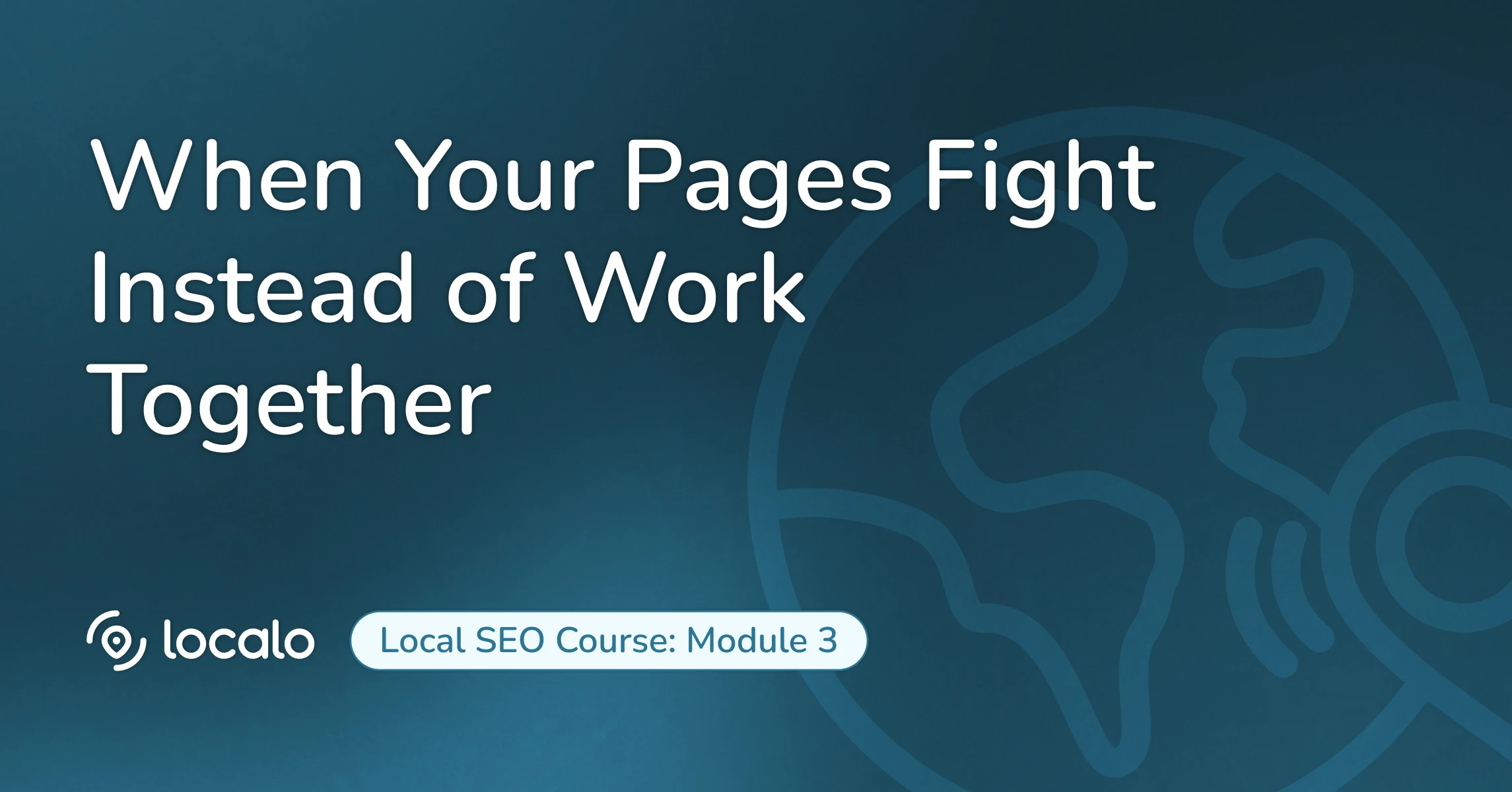Here’s something that shocks most: having too many similar pages can actually hurt your search rankings. This happens when your pages compete against each other instead of working together. It’s a problem called “cannibalization” (meaning your pages are eating each other’s ranking potential).
Cannibalization Problem
Imagine a local cleaning service that creates separate pages for:
- “house cleaning Atlanta”
- “home cleaning Atlanta”
- “residential cleaning Atlanta”
- “Atlanta house cleaning”
Google sees these as four different pages targeting the same search and can’t decide which one to rank. Instead of having one strong page ranking well, all four pages might struggle to rank at all.
Strategic Page Consolidation Method
Step 1: Audit Your Current Pages List every page that targets similar keywords. If you have multiple pages competing for the same searches with the same intent, you’ve got cannibalization.
Step 2: Choose Your Champion Page Pick the strongest performer (check your website analytics) or the one with the best user experience.
Step 3: Redirect or Merge Either redirect all weaker pages to your champion page without moving content, or combine the best content into one comprehensive resource.
Hypothetical Success: Consider an HVAC company that had 8 different pages targeting “air conditioning repair” variations. If they consolidated these into one comprehensive page called “AC Repair Phoenix - Same Day Service, All Brands,” they could potentially jump from page 4 to a much higher position within several weeks because all their ranking power would be focused on one strong page.
When You Actually Need Multiple Pages
Sometimes you DO need multiple location or service pages. Here’s how to do it without cannibalization:
Geographic Differentiation:
- “Plumber North Phoenix” (different service area)
- “Plumber Scottsdale” (different city)
- “Plumber Tempe” (different community)
Service Differentiation:
- “Emergency Plumber Phoenix” (urgency-focused)
- “Commercial Plumber Phoenix” (business-focused)
- “Drain Cleaning Phoenix” (specific service)
Audience Differentiation:
- “Senior-Friendly Dentist” (age-focused)
- “Pediatric Dentist” (child-focused)
- “Cosmetic Dentist” (goal-focused)
The key? Each page must serve a genuinely different search intent (what the person is trying to accomplish).
Welcome back to our Complete Local SEO Course!
You’ve discovered exactly how your customers search - you’re becoming a real keyword detective! Now let’s make sure your pages work as a team instead of competing against each other. Today we’re tackling something that shocks most: having too many similar pages can actually hurt your search rankings.
No complicated fixes needed here - just smart page strategy that works. Because here’s what’s happening - many businesses accidentally create multiple pages that target the same keywords, and Google gets confused about which page to show. When Google’s confused, nobody wins.
What is this cannibalization problem, and why does it hurt?
Here’s something that shocks most people - having too many similar pages can actually hurt your search rankings. This happens when your pages compete against each other instead of working together. It’s called “cannibalization” - meaning your pages are literally eating each other’s ranking potential.
Think of it like this - imagine you have four salespeople all trying to sell the same product to the same customer at the same time. Instead of being helpful, it’s confusing and annoying. That’s exactly what happens when you have multiple pages targeting the same keywords.
Let me give you a real example. Imagine a local cleaning service that creates separate pages for “house cleaning Atlanta,” “home cleaning Atlanta,” “residential cleaning Atlanta,” and “Atlanta house cleaning.”
Now, to the business owner, these might seem like different services or different ways people might search. But to Google, these all mean the same thing - residential cleaning services in Atlanta. Google sees these as four different pages targeting the same search and can’t decide which one to rank. Instead of having one strong page ranking well, all four pages might struggle to rank at all. You’ve diluted your ranking power across four weak pages instead of concentrating it in one strong page.
How to fix it if you’ve accidentally cannibalized your pages?
Here’s your rescue plan, and it’s simpler than you might think.
Step 1 - audit your current pages. List every page that targets similar keywords. If you have multiple pages competing for the same searches with the same intent, you’ve got cannibalization happening. You can find this by searching for your main keywords and seeing if multiple pages from your own site show up in the results.
Step 2 - choose your champion page. Pick the strongest performer - check your website analytics to see which page gets the most traffic or conversions - or the one with the best user experience. This becomes your main page for that topic.
Step 3 - redirect or merge. Either redirect all weaker pages to your champion page without moving content, or combine the best content into one comprehensive resource. The goal is to concentrate all your ranking power into one amazing page instead of spreading it across multiple weak ones.
When do you actually need multiple pages?
Sometimes you DO need multiple location or service pages, and I want to make sure you understand when this makes sense. Here’s how to do it without cannibalization happening.
Geographic differentiation works well when you serve truly different areas. “Plumber North Phoenix” for a different service area, “Plumber Scottsdale” for a different city, “Plumber Tempe” for a different community. Each of these serves different people with different local concerns.
Service differentiation is effective when the services are genuinely different. “Emergency Plumber Phoenix” for urgency-focused searches, “Commercial Plumber Phoenix” for business-focused searches, “Drain Cleaning Phoenix” for specific service searches. These target different customer needs and different search intents.
Audience differentiation can work too when you serve different types of customers. “Senior-Friendly Dentist” for age-focused searches, “Pediatric Dentist” for child-focused searches, “Cosmetic Dentist” for goal-focused searches. Each of these appeals to different customer groups with different needs.
The key? Each page must serve a genuinely different search intent - what the person is trying to accomplish. If someone searching for any of your keywords would be equally happy with any of your pages, then you probably don’t need multiple pages.
Think of it like this - would you rather have four people whispering your message or one person speaking clearly and confidently? That’s exactly what page consolidation does for your search rankings. You go from multiple weak signals to one strong, clear signal that Google can confidently show to searchers.
In our next video, we’re covering the quick optimization wins that most businesses miss - title tags, descriptions, and headers that Google actually gave us the playbook for. These are simple changes that can have immediate impact on your rankings. No guessing games! Thanks for joining me today, and I’ll see you in the next video!
The websites and Google Business Profiles used throughout the course are for educational purposes only. We're not affiliated with these businesses and don't claim any endorsement from them. All trademarks belong to their owners. Some examples include visual changes (made with browser tools) to help illustrate the SEO concepts we're teaching. These edits are strictly local and illustrative of specific SEO concepts. They don't affect the original websites.



